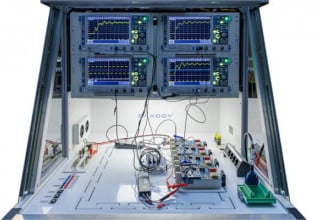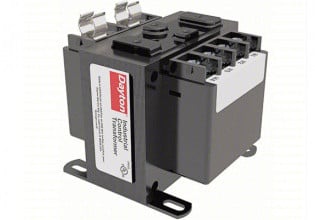Optimized EMC Conditions in Electrical Drive Systems
This article introduces the utilization of FUSS-EMV all-pole sine filter for applications running at lower switching frequencies.
Frequency converters allow the dynamic operation of electric drives, but at the same time, their functional principle inherently results in high-frequency interferences. Line filters are usually installed to keep high frequency, grid-bound interferences out of the power grid in accordance with EMC standards.

However, if one follows the interference paths more closely, it becomes clear that the source are the power semiconductors inside the converter and that those interferences affect the output lines as well. While sine wave filters reduce line to line interferences at the inverter output, a different type of interference can bypass a normal sine wave filter. These interferences, which have the same phase in all lines, are known as common-mode noise.
This assessment led to equip a sine filter with an additional component to suppress common mode noise: the common mode filter. Common mode interferences show up in distorted line-to-earth voltages at the output of the frequency converter. The utilization of a common mode filter eliminates the interferences and returns the signal to its original sinusoidal waveform.
Sine filters equipped with a common mode filter are also known as all-pole sine filter. The performance of all-pole sine filters is excellent. Due to the attenuation of the interference at the source, no interference makes it to the output devices connected to the converter. This has enormous advantages for the user. As a result, expensive shielded motor cables become unnecessary and standard unshielded cables can be used without length restrictions! The motors run quietly, bearing currents are significantly reduced and the grid-side EMC filtering can often be omitted. Altogether, it leads to a considerable cost reduction.
The only requirement for the utilization of FUSS EMV all-pole sine filter is a minimum switching frequency of at least 6 kHz. For applications running at lower switching frequencies, custom built all-pole filters can be designed to meet specific requirements. Any drive system benefits from the utilization of all-pole sine filter!
Do not hesitate contacting us, our experienced engineers are ready to advise on all EMC related matters.
About FUSS-EMV
In 1986, FUSS-EMV developed its first interference suppression filter - since then FUSS-EMV has become one of the leading providers of EMC solutions. The basis for this success was the experience of more than 100 years of development and production of electromechanical controllers, transformers and rectifiers. Today, the FUSS-EMV range of services covers a variety of areas such as EMC suppression in electrical systems, EMC solutions for industrial sectors such as renewable, e-mobility, mechanical and plant engineering, and more. FUSS-EMV offers customers the best possible solutions. Individual consultation comes first.






